Will Abbott Have The Number For Vouchers In The 89th Legislature?
Which seats do we need to flip to shut Governor Abbott down?
Note: The 2020 margins I cite are precinct-level analyses based on the maps made during the 2021 redistricting. SOURCE.
Now that the primary runoffs are over, we have a good look at the Republicans who will be on the ballot in November. House Republicans would need 76 votes to pass vouchers in the 89th Legislature. I went through all the Republican seats (plus HD80) and compared them to the Texas Class Teacher Association ratings and Greg Abbott’s endorsements to determine how many votes there would be for vouchers.
Here is the complete list:
In case you were wondering, it’s exactly 76. That’s if none of these seats flip or none of the previous anti-voucher Republicans flip.
The anti-voucher crowd and people dedicated to saving public schools should target the flippable seats in this list to stop vouchers in the 89th Legislature.
Which seats are those?
While I think many seats can be flipped and are within a few points of flipping, we should say that anything that was a +10 Trump district or less in 2020 or less is fair game.
Here’s why:
Democrats have been overperforming around the country by an average of +11 points.
Several Trump-backed candidates, including David Covey, lost in the primary runoff, a sign that Trump’s popularity waned in Texas.
Vouchers are unpopular among Democrats, and they were unpopular at the Texas GOP Convention among Republican women.
Many areas on this list have faster-changing demographics than anywhere else. While some might have been +10 in 2020, the significant changes in these counties will impact their swing in 2024.
The Republican Party in Texas is experiencing internal divisions, particularly between establishment Republicans and more extreme factions. This infighting weakens the party’s overall cohesion and effectiveness, providing an opening for Democratic challengers.
The growing extremism within the GOP, including strict abortion laws, book bans, and anti-LGBTQ+ policies, is alienating moderate Republicans and independents. This backlash can be harnessed to motivate voters to support Democratic candidates who promise more inclusive policies.
With that being said, here is the list of the targeted Republican seats:
That’s 19 targeted Republican seats. We need 12 to flip to win back the Texas House. Several long-time politicos, like Scott Braddock and Harvey Kronberg, are predicting Democrats can flip up to 9 and 10 seats this November.
If Democrats flipped ten seats, we wouldn’t flip the House, but we would shut down vouchers and many other draconian policies. Plus, we need to hold on to HD80, which is the only seat Democrats are at risk of losing.
Another thing I want you to take a look at is how these Republican seats are distributed by county:
Cameron County.
HD37 - Janie Lopez (R)
Williamson County.
HD52 - Caroline Harris Davila (R)
Bell County.
HD54 - Brad Buckley (R)
HD55 - Hillary Hickland (R)
Collin County.
HD61 - Keresa Richardson (R)
HD66 - Matt Shaheen (R)
HD67 - Jeff Leach (R)
Denton County.
HD63 - Ben Bumgarner (R)
HD65 - Mitch Little (R)
Uvalde County.
HD80 - Don McLaughlin (R)
Tarrant County.
HD94 - Tony Tinderholt (R)
HD96 - David Cook (R)
HD97 - John McQueen (R)
Dallas County.
HD108 - Morgan Meyers (R)
HD112 - Angie Chen Button (R)
Bexar County.
HD118 - John Lujan (R)
HD121 - Marc Lahood (R)
HD122 - Mark Darazio (R)
Harris County
HD138 - Lacey Hull (R)
Notice something?
Urban counties: Tarrant, Dallas, Harris.
Suburban counties: Williamson, Collin, Denton.
A mix of urban/suburban: Cameron, Bell.
Rural: Uvalde.
The only rural seat on this list has been held by a Democrat for many years (Tracy King—HD80), who retired, leaving it open. Otherwise, the focus is on urban and suburban counties. There could be an even bigger focus on urban since places like Collin and Williamson Counties are proliferating and will be urban counties in another decade. (But let’s not get ahead of ourselves.)
The Texas Democratic Party (TDP) has spent the last decade focusing on rural counties. We now know that’s a losing strategy. Don’t worry; the convention in the next few weeks will bring many changes to the TDP. Will the outcome be an aggressive urban strategy? We’ll see.
DFW has emerged as one of the biggest influencers in Texas elections. The four central counties (Dallas, Tarrant, Collin, and Denton) are a massive piece of this puzzle.
The two seats in Dallas County (HD108 and HD112) were both less than +1 Trump in 2020. If Colin Allred can pull 65% of the vote in Dallas County, those seats should naturally flip.
There are three seats in Tarrant County, each about +9 Trump in 2020. Tarrant County’s demographics are changing quicker than most counties, making it a majority-minority county. With so much drama happening at the county level with far-right politicians, we may see a surge of motivated voters here.
Collin County’s population is growing faster than almost anywhere in the county. We should expect to see Collin County go blue in November. The three House seats here were all within +7 Trump in 2020. Of course, the Democratic campaigns matter, but when Collin flips, we may also see several other down-ballot flips.
While Denton County isn’t growing as fast as Collin County, it’s still snowballing. Both of the Republicans in these possible flippable seats are terrible, far-right, pro-voucher, IVF-bans, and secession. Neither is popular, even within the Republican ranks.
Voter engagement and turnout in DFW matter a lot. We can’t just rely on County Parties. Candidates and grassroots organizations need to play a huge part in this.
Why should we be targeting pro-voucher Republicans?
Vouchers siphon public funds that would otherwise go to public schools, reducing budgets for essential services such as teacher salaries, special education, extracurricular programs, and school maintenance. This financial strain disproportionately affects low-income and rural areas, where public schools are often underfunded and overburdened. It will also drastically raise property taxes.
Private schools receiving voucher funds are not held to the same standards of accountability and transparency as public schools. They are not required to follow state curriculum guidelines, administer standardized tests, or disclose performance metrics. This lack of oversight can lead to inconsistent educational quality and outcomes.
Vouchers often lead to increased segregation, both socioeconomically and racially. Private schools selectively admit students, frequently excluding those with special needs or from lower-income backgrounds. This segregation fosters inequality, leaving public schools with higher concentrations of students requiring more resources and support but with fewer financial means to provide them.
Vouchers introduce market dynamics into education, treating it as a commodity rather than a public good. This shift undermines the stability of public education systems, where the goal should be to provide equitable education for all. Instead, resources are funneled toward private interests, destabilizing public schools and creating a fragmented educational landscape.
It’s time for every Texas voter to support the candidates fighting against pro-voucher Republicans.
Support the Democratic candidates running against these pro-voucher Republicans. These candidates are fighting to preserve public education and ensure that every child in Texas has access to quality schooling. Donate to their campaigns, attend their events, and spread the word about their platforms.
Get involved in the grassroots efforts in critical counties. Volunteer to block walk, phone bank, or assist with campaign events. Your time and effort can help reach undecided voters and mobilize supporters. Engage with local Democratic and grassroots organizations to coordinate your efforts and maximize impact. Key counties like Dallas, Tarrant, Collin, Denton, and Williamson need all hands on deck to turn the tide.
Educate your friends, family, and neighbors about the dangers of voucher programs and the importance of this election. Use social media to share information and raise awareness. Attend local school board meetings and town halls to advocate for public education and hold elected officials accountable.
The fight for public education is a fight for our future. By coming together and taking action, we can ensure that Texas remains a place where every child has the opportunity to succeed. Let’s mobilize, organize, and make our voices heard this November. Together, we can flip these seats, stop the voucher agenda, and protect public education for future generations.
Let’s get to work.
159 days left until the November 5 election!
LoneStarLeft’s Newsletter is a reader-supported publication. To receive new posts and support my work, consider becoming a free or paid subscriber.
Follow me on Facebook, Twitter, TikTok, Threads, YouTube, and Instagram.

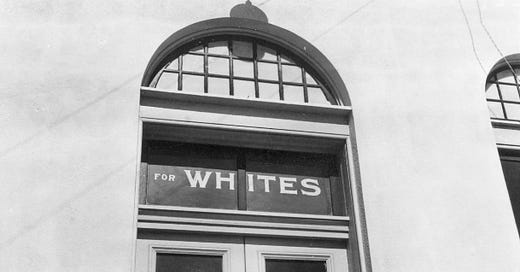



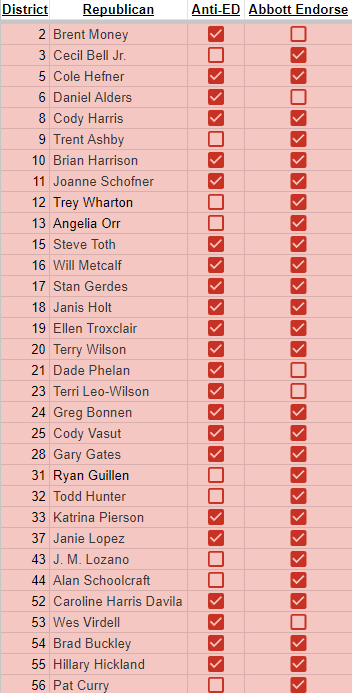
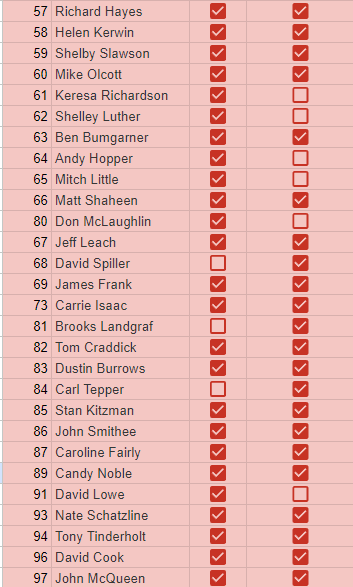
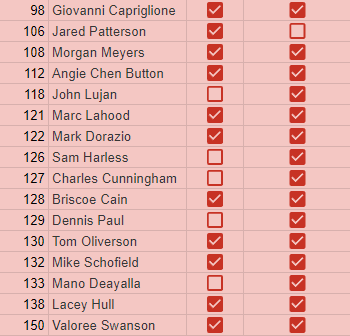
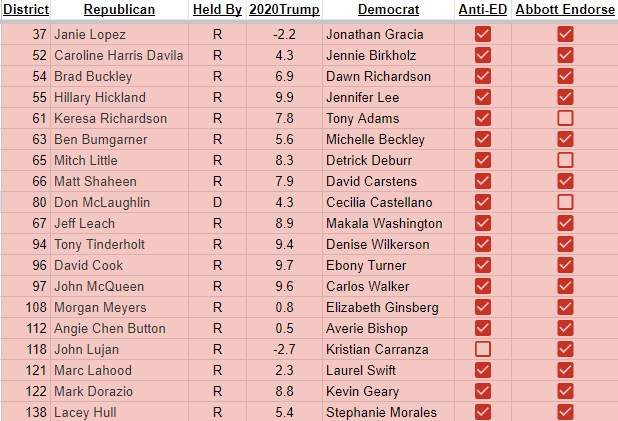

Thanks again for a very informative article and for providing cogent reasons why it is necessary to oppose Republicans supporting vouchers. Democrats definitely need to organize to flip those seats and win a majority in the Texas House of Representatives in November.
Just became a paid subscriber because of this article and many others. I'm going to start following and will be sending five dollars to each of the 19 dems whose districts need to be targeted. Thank you, Michelle.